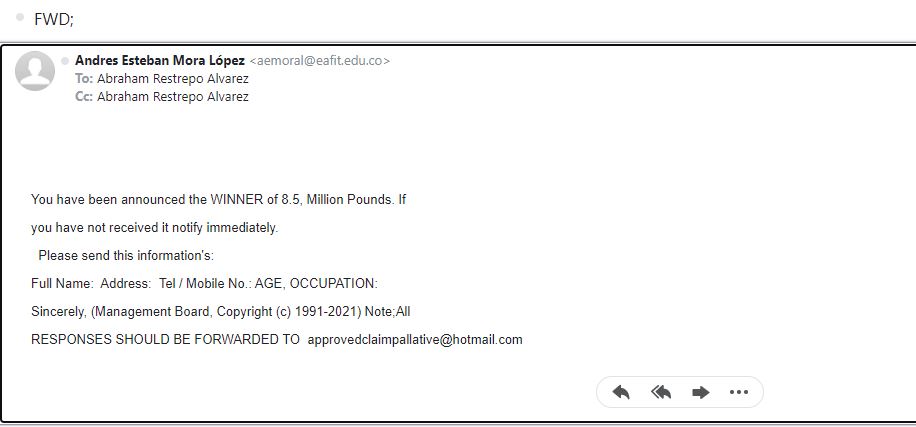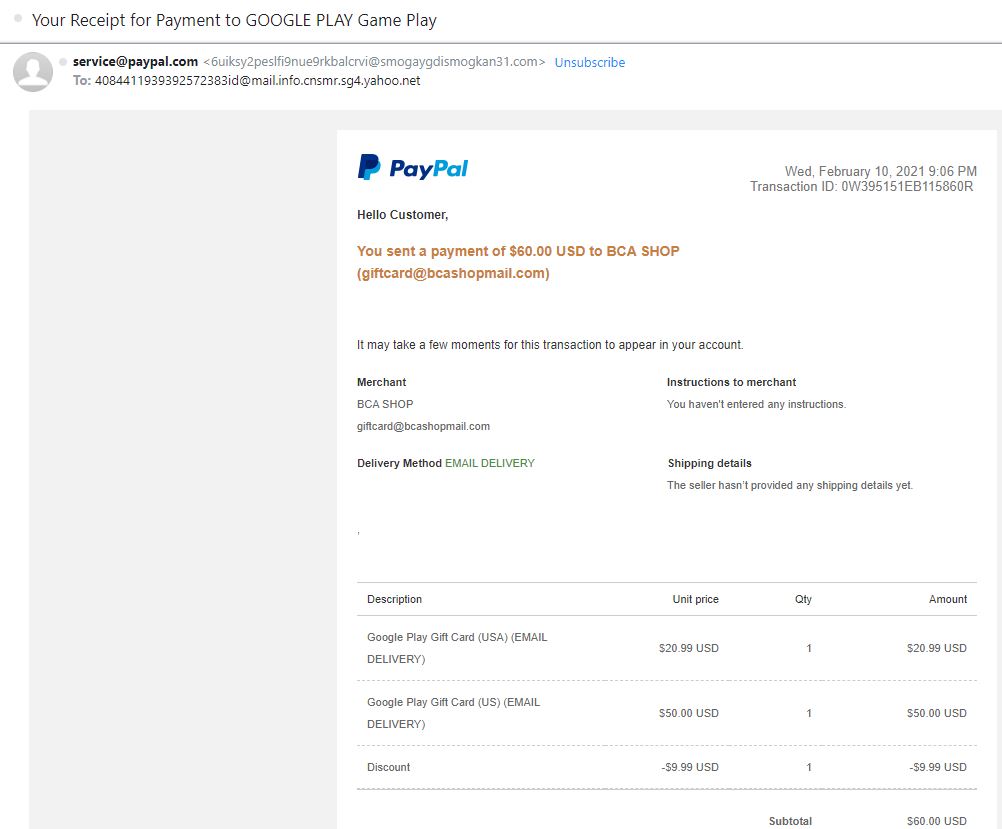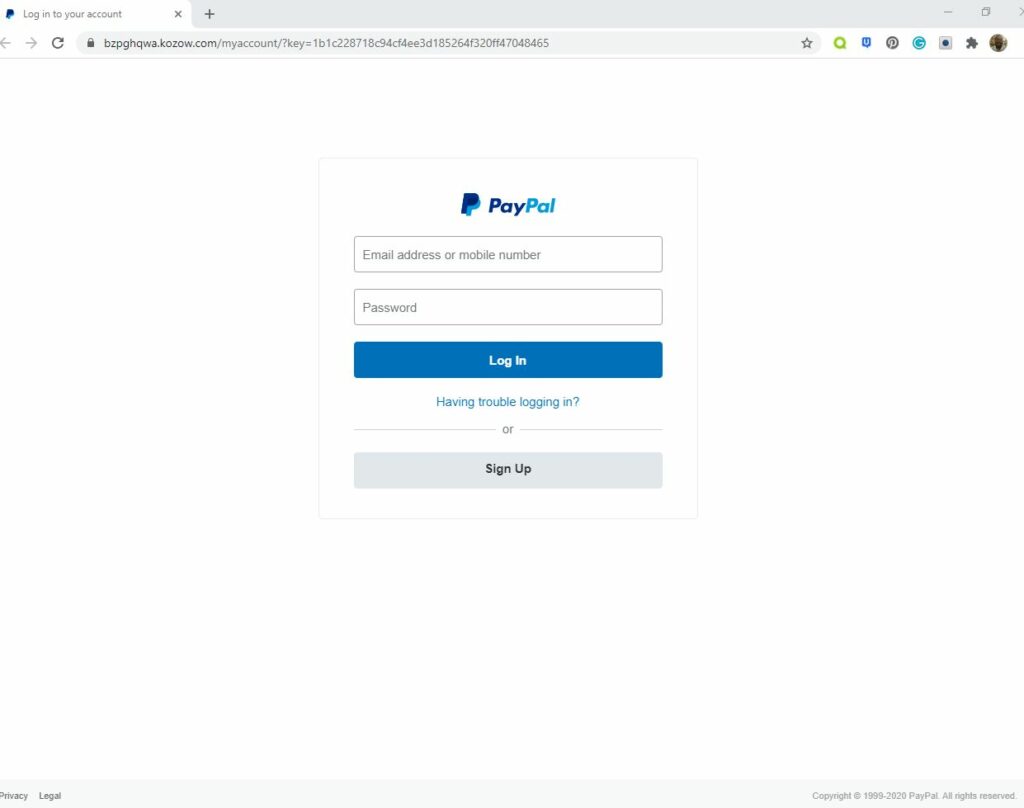What Online Scams Are Circulating These Days?
One of my first posts of the year had to do with some scams that I received from my email inbox. I’ve talked about some phishing scams as well as scams promising me millions of dollars and you can read more about those by clicking here. Now that we’re in the second month of the year, you might be wondering what online scams are circulating around the internet these days.
That is exactly what I’m going to talk about and show you some of the scams that I’ve received this month. Most of them are similar to other email scams I’ve talked about in the past, but they are still important to talk about because I don’t want anyone to become a victim of them. Without further ado, lets’ get right to it.
Scam Threat
The first scam I want to go over and the threat it represents has to do with an email I received back on February 7th. Now this isn’t a very long email, but what it does have seems very suspicious. First off, the email appears as a forward, meaning the email come from somewhere else and then later passed along to me.
Now that’s not necessarily unusual until you read the heart of the email. In this case, it says that I’ve been announced as a winner of 8.5 million pounds. Pounds is the money that is used in the UK. I am in the United States so it seems very strange that I would win money in pounds considering I didn’t enter anything in order to win something like that.
The email then continues on saying that if I had not received the money yet, then I need to send the following information that’s listed below which includes a full name, address, telephone number, age, and occupation. After it says all that, then it says “Sincerely, Management Board”. I’m sorry, but Management Board of WHAT?! It doesn’t say anything specifically that it would indicate it’s from a legitimate contest company or lottery.

Right below that, there is an email address listed that they want all the information forwarded to and I hate to say this, but that email address does not look like an official company’s email as it is a hotmail address. This is a major threat because the purpose of the email is to make you think you’ve won serious money and all you have to do to get it is to provide some information about yourself.
The problem is, if you provide that information and send it to the email that’s provided, the scammers will have important stuff about you to further along their scam against you or to possibly initiate identity theft. This is what makes these type of emails so dangerous.
Next, I want to take a look at another type of email scam known as phishing scams which I’ve talked greatly about in the past. In this case, I’ve received an email that’s supposedly from PayPal claiming that I sent a payment of $60.00 for purchase of Google Play Gift Cards.
The threat from this type of email scam is that it wants you to panic and think that the supposed purchase of gift cards was done in error or not authorized by you. The email then says that if you did not initiate that order, then it wants you to click the link they’ve included inside the email. The big problem with that is if you click that link, it will take you to a page that will look like PayPal, but really isn’t. If you use your actual login information to try and login on this phony site, the scammers will have captured your real login information and will use it to gain access to your actual PayPal account and they really start to do monetary damage to your account.
Who it Affects The Most
These kinds of scams can affect anyone, but those who are especially susceptible to being overcome with emotion and not thinking things through logically. It can also really affect those who are in a very tight spot financially which makes these scams especially dangerous.
The elderly and the very young say 18-25 age group could easily fall for these scams, but as I said earlier, anyone could fall for them if they don’t know what to look for. My biggest concern though has always been for the elderly because of where I work. I happen to work at a financial institution and unfortunately, I’ve seen a lot of people fall victim to scams such as those with the majority being the elderly.
This is why I talk a lot about these type of scams because I want to show people what’s out there and what to look for so that no one becomes a victim of these kinds of scams. It’s very hard to recover from them if one does become a victim especially if it leads to identity theft.
If you know someone who could potentially become a victim of these scams, don’t hesitate to help them out and monitor what they’re doing if you’re able to. In the long run, you will save them from much heartache and financial hardship.
Where it’s Happening
The scams that I have talked about above are most commonly found through email. So much email is sent daily and sometimes it’s hard to discern which is legitimate and which is not. There are definitely red flags to look for and I walk about those here in a little bit.
There are many types of scams out there, but these days, it seems that email is the easiest way to get someone to become a victim of one of them.

You can also become a victim of scams from your smartphone as a lot of times, scammers will use text to send out their phishing scams. They’ll try to make it seem like it’s from a legitimate company, much like they do with their email scams, and they’ll include a link for you to click on in the text.
Sadly though, if you click the link, you will not be going to a company’s legitimate website and instead a phony website made to mimic the real one. This is where people easily become victims. So is there anything that can be done in order to not be a victim of phishing scams? The answer is definitely yes and that’s what I’ll talk about next.
How Best to Avoid Scams
There are many ways to avoid becoming a victim. First and foremost, let’s look back at the first email scam I talked about at the beginning. Now it said that I had won 8.5 million pounds, but again, that is UK/England currency. Now I know I didn’t sign up for any lottery or contest to win such a prize so I already know that this is bogus.
Also, if you pay attention to the outside of the email, which would be the subject line, it just says FWD. That means the email was forwarded from someplace else. What’s odd is that it says it’s to an Abraham Alvarez. The email address appears to come from a university. Those alone should be major red flags as they have nothing to do with what you would think would be an official lottery or contest company.
The next thing you want to look for are grammatical and spelling errors and there are a few of them. The word “information’s” is misspelled and where it’s asking you to provide information, age and occupation is completely capitalized which I also find odd. The email address approvedclaimpallative@hotmail.com is not a legitimate lottery’s address. They would not use a 3rd party email service for their legitimate business if this were a real email.
Also, think about this. Why don’t they address you by name if you really won something or participated in something where you can win a large prize such as what they are claiming? The fact that they are asking for personal information from you to supposedly receive your winnings and the fact that it is said this email originated from what they call the Management Board just screams scam. Remember, you did nothing to win anything, especially a lottery/contest from a different country so this is too good to be true and these people are trying to harm you. It would be wise to delete this type of email.
What about the PayPal email? This one is designed to play with your emotions by making you think that a purchase was made through your PayPal account in error and the scammers are hoping that you’ll click the link inside the email to “fix” this problem. As I said earlier, the website that the link will bring you to is not that of PayPal even though it’s designed to look like the real thing.

So how do you avoid this type of scam? Well first of all, the biggest clue that this is a scam is by investigating the address that the email actually came from. An official email from PayPal will have an “@PayPal” in the address and is generally a short email address. Now when you first look at it in your inbox, it’ll look like it legitimately came from PayPal as it shows “service@paypal.com” because that is what PayPal uses to send official emails to you.
This is where the email gets extremely dangerous as a scam because PayPal sends emails using the service@paypal.com designation to let you know of a transaction that was completed on your account. In this case it says that this is a receipt for Payment to Google Play Game Play. This is where the scammers are hoping you are in complete panic mode, because once you open the email, it will show supposed charges of items to your PayPal account. It is VITAL that you maintain your composure and look very carefully at the email.
If you look at the very top of the email when you open and look at the section where the email address is listed, you’ll notice something very different. Right next to where it says service@paypal.com, there is another email address and folks that is the TRUE email address and it resembles nothing of an actual PayPal email address designation. Instead, what is shown is a very long combination of letters and numbers.
Once you spot that, then the rest of the email will fall apart because you’ll start to notice other inconsistencies such as spelling and grammatical errors, the payment method that is said was used in your PayPal account (in this case, it said I will be charged on my credit card attached to my PayPal account. I know right there that this is a scam because I have no credit card attached to my account), and one of the biggest ones is the fact that they do not address you by name, especially your first name. They simply address you as customer, which if you truly have an account with PayPal, they should address you by your first name.

If you pay attention to those things, you’ll quickly see that this is a scam and not really a cause for alarm to your account. However, if you’re still very concerned that something truly did happen to your account, simply open a different web browser and go to the main address of PayPal and log in to your account that way. You’ll more than likely see that your account is fine. NEVER click the link inside that type of email because it will not take you to PayPal and the website that comes up is designed to steal your real login information.
You might be tempted to delete this type of email once you spot all the red flags, but you don’t need to do that immediately. PayPal has an email address that you can forward these type of scams to so that they are aware of what’s circulating out there and put a stop to it.
Now that you know what online scams are circulating around the internet these days, you can warn others about them and be able to spot the scams pretty easily now.

